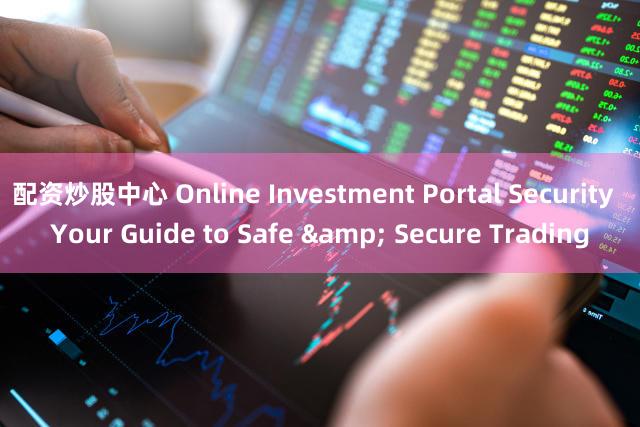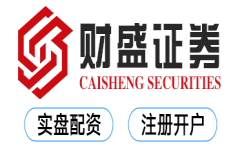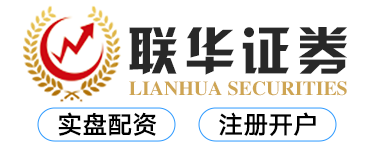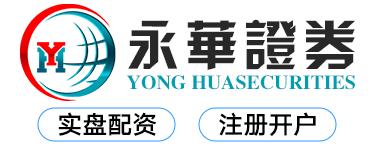
Online Investment Portal Security: Your Guide to Safe & Secure Trading
Meta Description: Learn about the security measures employed by reputable online investment portals, safeguarding your funds and personal information. Discover how to identify secure platforms and protect yourself from online investment scams.
Headline: Don't Gamble with Your Money: Unlocking the Secrets to Secure Online Investing
Investing online can feel like walking a tightrope – thrilling, potentially rewarding, but with a significant risk of a nasty fall. The digital landscape is teeming with opportunities, but sadly, also riddled with scams and insecure platforms. Choosing the right online investment portal is paramount, and that choice hinges on understanding the security measures in place. It's not just about flashy websites and promises of riches; it's about the nitty-gritty details that protect your hard-earned money and personal data. This isn't your grandpa's brokerage; online investing demands a new level of vigilance. We're talking robust encryption, multi-factor authentication (MFA), stringent regulatory compliance, and a proactive approach to fraud detection. Think of it like this: you wouldn't leave your house unlocked, would you? Similarly, you shouldn't trust your investments to a platform that lacks robust security. This in-depth guide will demystify online investment portal security, equipping you with the knowledge to make informed decisions and navigate the world of online trading with confidence. We'll cover everything from identifying red flags to understanding the regulatory frameworks that protect investors. We'll even delve into the practical steps you can take to bolster your own online security, turning you from a potential victim into a savvy, secure investor. So, ditch the guesswork and join us as we explore the critical aspects of protecting your financial future in the digital age. Let's dive in!
Online Investment Portal Security Measures
Choosing a secure online investment portal isn't about luck; it's about due diligence. Reputable platforms employ a multi-layered security approach, encompassing various measures designed to protect your assets and personal data. Let's break down the key elements:
-
Data Encryption: Think of encryption as a secret code. All your sensitive data, from account details to transaction history, should be encrypted both in transit (while traveling between your computer and the platform's servers) and at rest (when stored on their servers). Look for platforms utilizing industry-standard encryption protocols like TLS/SSL (Transport Layer Security/Secure Sockets Layer) – you'll often see a padlock icon in your browser's address bar indicating a secure connection. Anything less is a major red flag!
-
Multi-Factor Authentication (MFA): MFA is your extra layer of security. It requires more than just a username and password to access your account. This could involve a one-time code sent to your phone via SMS, an authentication app (like Google Authenticator or Authy), or even biometric verification (fingerprint or facial recognition). MFA significantly reduces the risk of unauthorized access, even if your password is compromised. Seriously, enable it.
-
Firewall Protection: A firewall acts as a gatekeeper, preventing unauthorized access to the platform's servers. Robust firewall systems are essential for preventing cyberattacks and data breaches. While you won't see this directly, it's a crucial aspect of a secure platform's infrastructure. Look for mentions of advanced firewall technologies in their security documentation.
-
Regular Security Audits: Reputable platforms undergo regular security audits and penetration testing. These independent assessments identify vulnerabilities and ensure that the platform's security measures are up to par. Look for evidence of these audits on the platform's website – transparency is key.
-
Regulatory Compliance: A secure platform will adhere to relevant regulations and industry best practices. For example, platforms operating in the US might be registered with the Securities and Exchange Commission (SEC), while those in Europe might comply with the Markets in Financial Instruments Directive (MiFID II). Compliance demonstrates a commitment to security and investor protection. Check the platform's "About Us" section for regulatory information.
-
Fraud Detection Systems: Advanced fraud detection systems use algorithms and machine learning to identify suspicious activities – think unusual login attempts or large, unexpected withdrawals. These systems are crucial in preventing and mitigating fraudulent transactions. This is often a behind-the-scenes element, but a platform's commitment to fraud prevention should be evident in their security policies and procedures.
Table 1: Key Security Features to Look For
| Feature | Description | Importance | |----------------------|------------------------------------------------------------------------------|--------------------------------------------------------------------------| | Data Encryption | Protects data in transit and at rest. | Prevents unauthorized access to sensitive information. | | Multi-Factor Auth (MFA) | Adds an extra layer of security beyond username and password. | Significantly reduces the risk of account compromise. | | Firewall Protection | Prevents unauthorized access to servers. | Protects against cyberattacks and data breaches. | | Regular Security Audits | Independent assessments identify vulnerabilities and ensure security measures. | Ensures the platform maintains a high level of security. | | Regulatory Compliance | Adherence to relevant regulations and industry best practices. | Demonstrates a commitment to security and investor protection. | | Fraud Detection Systems| Uses algorithms to identify and prevent fraudulent activities. | Protects against unauthorized transactions and financial loss. |
Identifying Red Flags: Spotting the Scammers
Unfortunately, not all online investment platforms are created equal. Here are some red flags to watch out for:
-
Unrealistic Returns: Promises of guaranteed high returns are a major red flag. Legitimate investments always carry some level of risk.
-
High-Pressure Tactics: If a platform pressures you to invest quickly, be wary. Legitimate investments allow time for due diligence.
-
Lack of Transparency: A lack of clear information about fees, security measures, or regulatory compliance is a significant warning sign.
炒股配资平台开户 -
Poor Website Design: A poorly designed or unprofessional-looking website suggests a lack of credibility.
-
Unlicensed or Unregulated: Ensure the platform is licensed and regulated by the appropriate authorities. This is crucial for investor protection.
-
Negative Reviews: Check online reviews and forums for feedback from other users. A pattern of negative reviews might indicate problems with the platform's security or practices.
Protecting Yourself: Best Practices for Secure Online Investing
Beyond choosing a secure platform, you can take proactive steps to protect yourself:
-
Strong Passwords: Use unique, strong passwords for each of your online accounts. Consider using a password manager to help you manage them securely.
-
Regular Password Changes: Change your passwords regularly.
-
Keep Software Updated: Keep your operating system and antivirus software up to date to protect against malware and viruses.
-
Beware of Phishing Scams: Be cautious of suspicious emails or messages requesting your login credentials. Legitimate platforms will never ask for your password via email.
-
Use a Secure Internet Connection: Avoid accessing your investment account from public Wi-Fi networks, as these can be vulnerable to hacking.
-
Monitor Your Accounts Regularly: Regularly check your account statements for any unauthorized activity.
Frequently Asked Questions (FAQs)
Q1: What happens if my online investment portal is hacked?
A1: While reputable portals take significant security measures, the possibility of a breach always exists. In the event of a security breach, a reputable platform will notify affected users immediately, often providing further guidance and support in securing their accounts. They may also offer credit monitoring services to mitigate potential identity theft risks. It’s crucial to report any suspicious activity to both the platform and relevant authorities.
Q2: How can I verify the legitimacy of an online investment portal?
A2: Check if the platform is registered with and regulated by the appropriate financial authorities in your jurisdiction (e.g., SEC in the US, FCA in the UK). Look for clear contact information, a physical address, and a transparent description of their services and fees. Independent reviews and testimonials can also offer valuable insights, but always analyze them critically.
Q3: Is it safer to invest through a traditional brokerage rather than an online portal?
A3: Both traditional and online brokerages can offer secure investment options. The key is to thoroughly research and choose a reputable firm regardless of its structure. Traditional brokerages might offer more personalized service, while online portals often provide greater accessibility and lower fees. Security should be your primary concern, regardless of your chosen method.
Q4: What are the legal implications if my funds are lost due to a security breach on the platform?
A4: The legal implications depend on numerous factors, including the platform's security measures, the nature of the breach, and the applicable laws and regulations. If negligence on the part of the platform contributed to the loss, legal recourse may be available. It's advisable to consult with a legal professional to assess your options and potential claims.
Q5: What should I do if I suspect fraudulent activity on my online investment account?
A5: Immediately contact the platform's customer support and report the suspicious activity. Change your password immediately and consider enabling MFA if you haven't already. You may also need to report the incident to your local law enforcement and potentially the relevant financial regulatory authority.
Q6: How often should I review the security policies of my online investment portal?
A6: It's a good practice to review the security policies and any updates at least annually, or whenever there are significant changes to your account or the platform's services. Staying informed about security measures helps you maintain control over your investments and personal data.
Conclusion
Navigating the world of online investment portals requires vigilance and informed decision-making. By understanding the security measures in place, identifying red flags, and taking proactive steps to protect yourself, you can significantly reduce your risk and invest with confidence. Remember, your financial security is paramount – don't let a lack of knowledge put your hard-earned money at risk. Do your homework, choose wisely, and invest smartly!
文章为作者独立观点,不代表财盛证券观点






